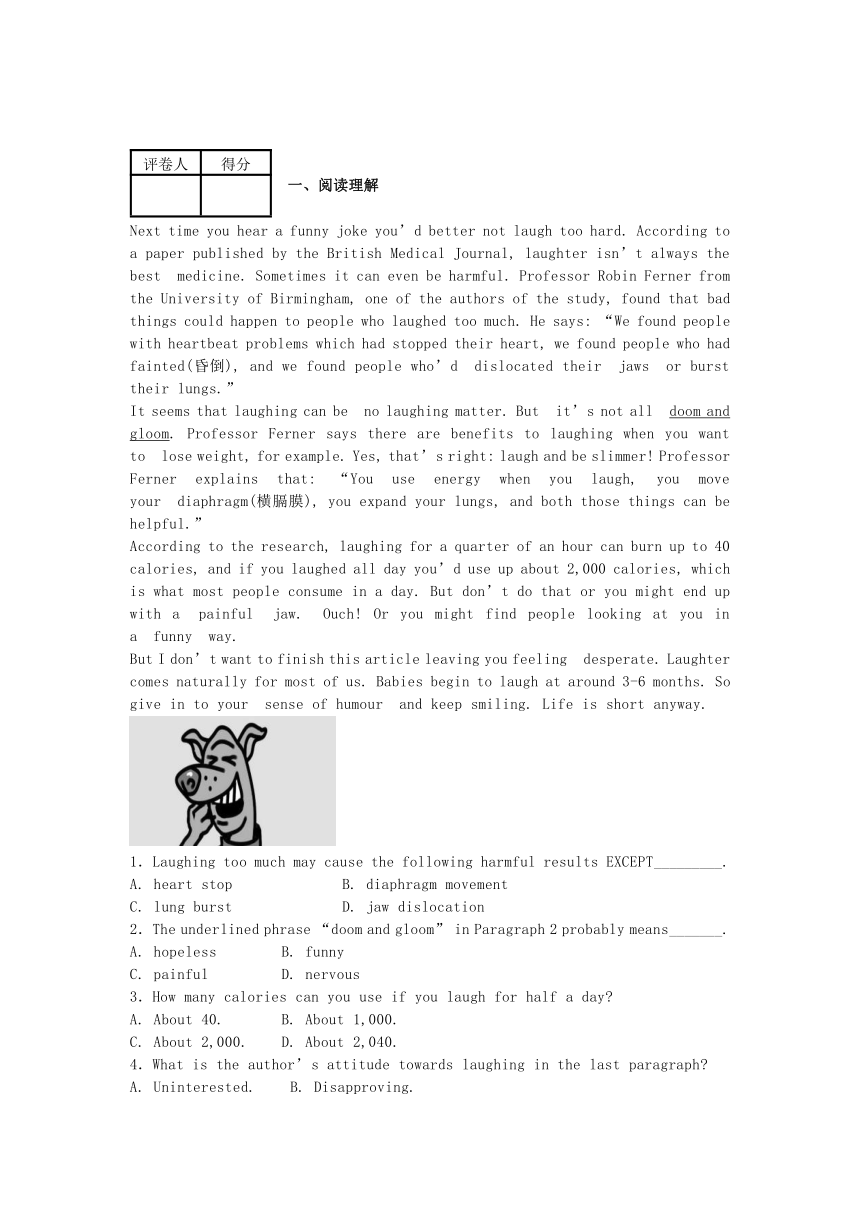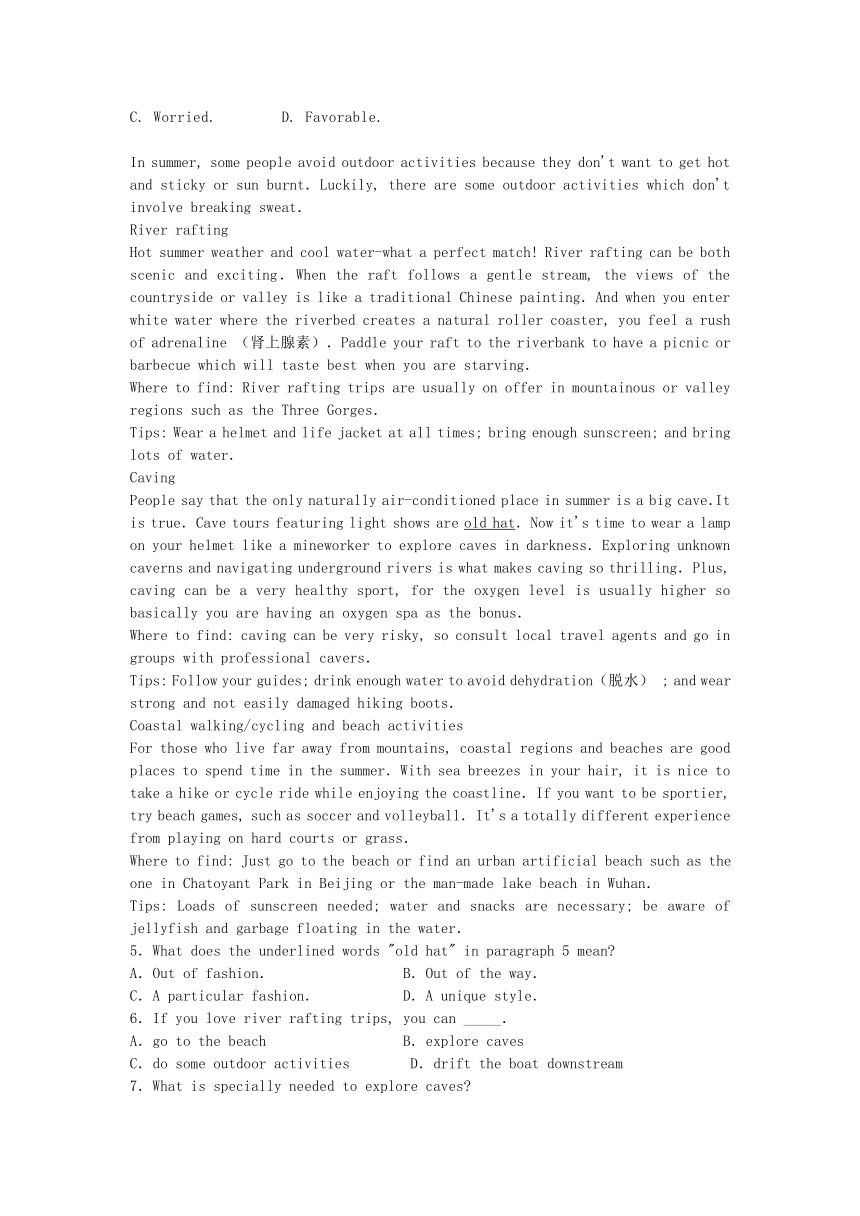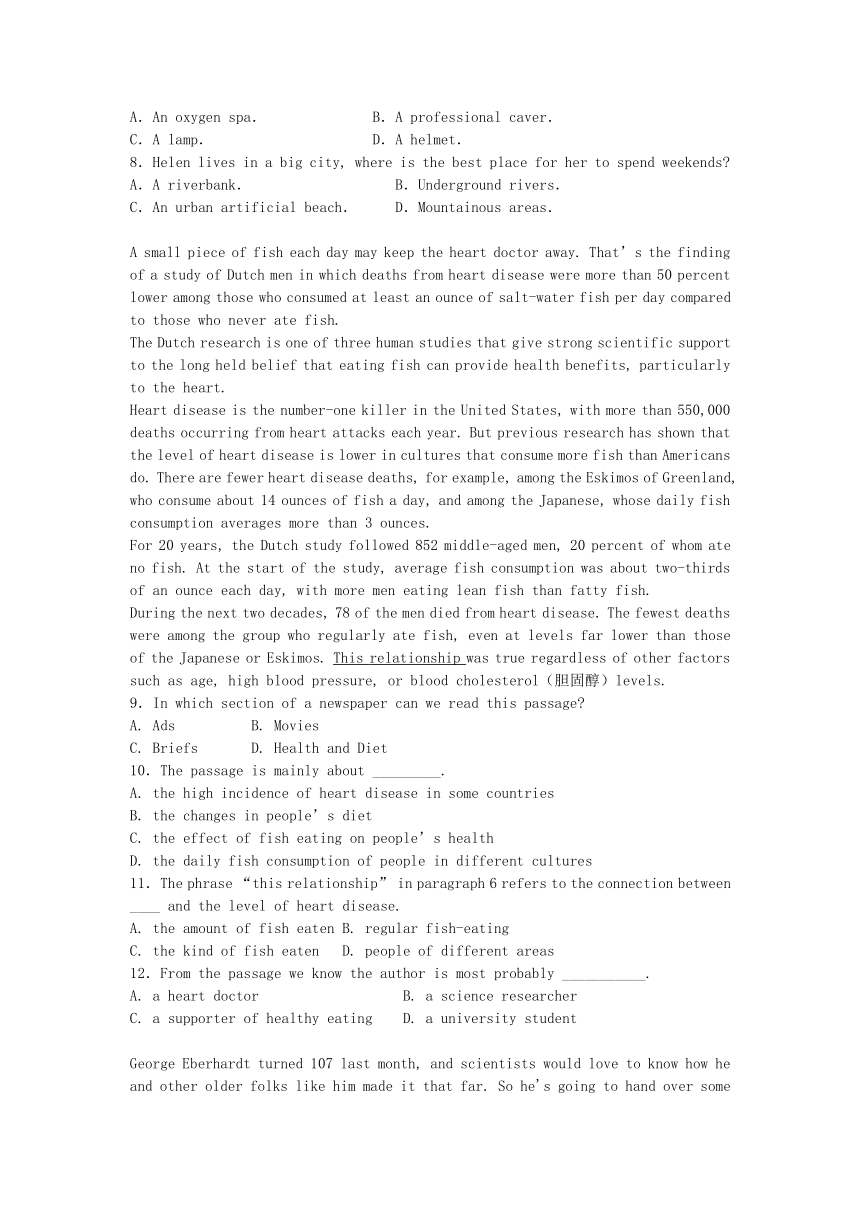【知识点专区】2015年高中英语 阅读理解健康保健类阅读 专项练习(含解析)
文档属性
| 名称 | 【知识点专区】2015年高中英语 阅读理解健康保健类阅读 专项练习(含解析) |

|
|
| 格式 | zip | ||
| 文件大小 | 44.4KB | ||
| 资源类型 | 教案 | ||
| 版本资源 | |||
| 科目 | 英语 | ||
| 更新时间 | 2014-11-08 00:00:00 | ||
图片预览



文档简介
评卷人
得分
一、阅读理解
Next time you hear a funny joke you’d better not laugh too hard. According to a paper published by the British Medical Journal, laughter isn’t always the best?medicine. Sometimes it can even be harmful. Professor Robin Ferner from the University of Birmingham, one of the authors of the study, found that bad things could happen to people who laughed too much. He says: “We found people with heartbeat problems which had stopped their heart, we found people who had fainted(昏倒), and we found people who’d?dislocated their?jaws?or burst their lungs.”
It seems that laughing can be?no laughing matter. But?it’s not all?doom and gloom. Professor Ferner says there are benefits to laughing when you want to?lose weight, for example. Yes, that’s right: laugh and be slimmer! Professor Ferner explains that: “You use energy when you laugh, you move your?diaphragm(横膈膜), you expand your lungs, and both those things can be helpful.”
According to the research, laughing for a quarter of an hour can burn up to 40 calories, and if you laughed all day you’d use up about 2,000 calories, which is what most people consume in a day. But don’t do that or you might end up with a?painful?jaw.?Ouch! Or you might find people looking at you in a?funny?way.
But I don’t want to finish this article leaving you feeling?desperate. Laughter comes naturally for most of us. Babies begin to laugh at around 3-6 months. So give in to your?sense of humour?and keep smiling. Life is short anyway.
1.Laughing too much may cause the following harmful results EXCEPT_________.
A. heart stop B. diaphragm movement
C. lung burst D. jaw dislocation
2.The underlined phrase “doom and gloom” in Paragraph 2 probably means_______.
A. hopeless B. funny
C. painful D. nervous
3.How many calories can you use if you laugh for half a day?
A. About 40. B. About 1,000.
C. About 2,000. D. About 2,040.
4.What is the author’s attitude towards laughing in the last paragraph?
A. Uninterested. B. Disapproving.
C. Worried. D. Favorable.
In summer, some people avoid outdoor activities because they don't want to get hot and sticky or sun burnt.Luckily, there are some outdoor activities which don't involve breaking sweat.
River rafting
Hot summer weather and cool water-what a perfect match! River rafting can be both scenic and exciting.When the raft follows a gentle stream, the views of the countryside or valley is like a traditional Chinese painting.And when you enter white water where the riverbed creates a natural roller coaster, you feel a rush of adrenaline (肾上腺素).Paddle your raft to the riverbank to have a picnic or barbecue which will taste best when you are starving.
Where to find: River rafting trips are usually on offer in mountainous or valley regions such as the Three Gorges.
Tips: Wear a helmet and life jacket at all times; bring enough sunscreen; and bring lots of water.
Caving
People say that the only naturally air-conditioned place in summer is a big cave.It is true.Cave tours featuring light shows are old hat.Now it's time to wear a lamp on your helmet like a mineworker to explore caves in darkness.Exploring unknown caverns and navigating underground rivers is what makes caving so thrilling.Plus, caving can be a very healthy sport, for the oxygen level is usually higher so basically you are having an oxygen spa as the bonus.
Where to find: caving can be very risky, so consult local travel agents and go in groups with professional cavers.
Tips: Follow your guides; drink enough water to avoid dehydration(脱水) ; and wear strong and not easily damaged hiking boots.
Coastal walking/cycling and beach activities
For those who live far away from mountains, coastal regions and beaches are good places to spend time in the summer.With sea breezes in your hair, it is nice to take a hike or cycle ride while enjoying the coastline.If you want to be sportier, try beach games, such as soccer and volleyball.It's a totally different experience from playing on hard courts or grass.
Where to find: Just go to the beach or find an urban artificial beach such as the one in Chatoyant Park in Beijing or the man-made lake beach in Wuhan.
Tips: Loads of sunscreen needed; water and snacks are necessary; be aware of jellyfish and garbage floating in the water.
5.What does the underlined words "old hat" in paragraph 5 mean?
A.Out of fashion. B.Out of the way.
C.A particular fashion. D.A unique style.
6.If you love river rafting trips, you can _____.
A.go to the beach B.explore caves
C.do some outdoor activities D.drift the boat downstream
7.What is specially needed to explore caves?
A.An oxygen spa. B.A professional caver.
C.A lamp. D.A helmet.
8.Helen lives in a big city, where is the best place for her to spend weekends?
A.A riverbank. B.Underground rivers.
C.An urban artificial beach. D.Mountainous areas.
A small piece of fish each day may keep the heart doctor away. That’s the finding of a study of Dutch men in which deaths from heart disease were more than 50 percent lower among those who consumed at least an ounce of salt-water fish per day compared to those who never ate fish.
The Dutch research is one of three human studies that give strong scientific support to the long held belief that eating fish can provide health benefits, particularly to the heart.
Heart disease is the number-one killer in the United States, with more than 550,000 deaths occurring from heart attacks each year. But previous research has shown that the level of heart disease is lower in cultures that consume more fish than Americans do. There are fewer heart disease deaths, for example, among the Eskimos of Greenland, who consume about 14 ounces of fish a day, and among the Japanese, whose daily fish consumption averages more than 3 ounces.
For 20 years, the Dutch study followed 852 middle-aged men, 20 percent of whom ate no fish. At the start of the study, average fish consumption was about two-thirds of an ounce each day, with more men eating lean fish than fatty fish.
During the next two decades, 78 of the men died from heart disease. The fewest deaths were among the group who regularly ate fish, even at levels far lower than those of the Japanese or Eskimos. This relationship was true regardless of other factors such as age, high blood pressure, or blood cholesterol(胆固醇)levels.
9.In which section of a newspaper can we read this passage?
A. Ads B. Movies
C. Briefs D. Health and Diet
10.The passage is mainly about _________.
A. the high incidence of heart disease in some countries
B. the changes in people’s diet
C. the effect of fish eating on people’s health
D. the daily fish consumption of people in different cultures
11.The phrase “this relationship” in paragraph 6 refers to the connection between ____ and the level of heart disease.
A. the amount of fish eaten B. regular fish-eating
C. the kind of fish eaten? D. people of different areas
12.From the passage we know the author is most probably ___________.
A. a heart doctor B. a science researcher
C. a supporter of healthy eating D. a university student
George Eberhardt turned 107 last month, and scientists would love to know how he and other older folks like him made it that far. So he's going to hand over some of his DNA.
He's one of 100 centenarians(百岁老人) taking part in a project that examines some of the oldest citizens with one of the newest scientific tools: whole-genome sequencing(全基因组测试), the deciphering of a person's complete collection of DNA.
Scientists think DNA from very old healthy people could offer clues to how they have lived so long. And that could one day lead to medicines to help the rest of us stay disease-free longer.
"It's very hard to get to 105 without some genetic advantages," says Dr. Thomas Perls, a geriatrics(老年医学) expert at Boston University. Dr.Perls is helping find centenarians for the Archon Genomics X Prize competition. The X Prize Foundation, best known for a spaceflight competition, is offering $10 million in prize money to researchers who decipher the complete DNA code from 100 people older than 100. The contest will be judged on accuracy, completeness and the speed and cost of sequencing.
Mr. Eberhardt played and taught tennis until he was 94and says he's participating in the X Prize project because he's interested in science and technology. It's not clear his genes will reveal much. Nobody else in his extended family reached 100, and he thinks only a couple reached 90, he said in a telephone interview.
So why does he think he lived so long? He attributes it to 70 years of marriage to his wife, Marie. She in turn cites his "intense interest in so many things" over a lifetime, from building radios as a child to pursuing a career in electronics research.
But scientists believe there's more to it, and they want to use genome sequencing to investigate. Dr. Richard Cawthon of the University of Utah, who is seeking longevity genes by other means, says it may turn up genetic features that protect against multiple diseases or that slow the process of aging in general.
13.What does the underlined word “deciphering” in the second paragraph probably mean?
A. Separating. B. Interpreting.
C. Gathering. D. Comparing.
14.________ will not be judged by the Archon Genomics X prize competition.
A. How many genes are studied
B. How precise the sequencing is
C. How fast the research is finished
D. The number of researchers
15.The fourth paragraph is mainly about ________.
A.what the Archon Genomics X prize competition is about
B.the significance of studying the genes that lead to longevity
C.how whole-genome sequencing is applied to the study of genes
D.the genetic advantages the centenarians have
16.Which of the following is TRUE about Mr. Eberhardt?
A.He doesn’t have any genetic advantages.
B.Most of his family have been long-lived.
C.His genes don’t reveal much about why he has lived so long.
D.He enjoyed doing electronics research.
17.Which of the following might be the best title for the passage?
A.Comparing One Hundred Centenarians
B.Who Will Win the Archon Genomics X Prize Competition?
C.A New Technology--- Whole –Genome Sequencing
D.Is the Secret to a Long Life in the DNA of Centenarians?
参考答案
1.B
2.A
3.B
4.D
【解析】
试题分析: 本文提到最后一项研究表明,笑并不是最好的良药,有时可能是有害的。但笑可以消耗很多热量,尽管如何不要放弃微笑,毕竟生活是短暂的。
1.B 细节理解题。根据第一段提到He says: “We found people with heartbeat problems which had stopped their heart, we found people who had fainted(昏倒), and we found people who’d?dislocated their?jaws?or burst their lungs可知危害性有心脏骤停,昏倒,脱臼,伤到肺,故B项没有提到。
2.A 猜测词意。根据第二段提到It seems that laughing can be?no laughing matter. But?it’s not all?doom and gloom. Professor Ferner says there are benefits to laughing when you want to?lose weight, for example.好象笑并不是玩笑的事情,但他也不是无用,教授说,当你想减肥时,笑是非常有效的,故选A项。
3.B 推断题。根据第三段提到if you laughed all day you’d use up about 2,000 calories, which is what most people consume in a day.可知一天消耗2000,那么半天就选B项。
4.D 推断题。根据最后一段提到So give in to your?sense of humour?and keep smiling. Life is short anyway.可知不要放弃幽默,保持微笑,毕竟生命是短暂的,故选D项。
考点:科普类阅读。
5.A
6.D
7.B
8.C
【解析】
试题分析: 夏天时,一些人总对户外运动唯恐避之不及,因为不想变得又热又黏。幸运的是,有些户外运动完全没有那样的问题。例如漂流,洞穴探险和沙滩运动等等。
5.A 推理题。根据上下文可知,old hat修饰cave tours featuring light shows有灯光表演的洞穴观光项目,而后文说现在可以像矿工一样,在安全帽上加上一盏探照灯探索未知洞穴。比较四个选项可知old hat在此处的意思为“过时的”。故选A。
6.D 推理题。根据小标题River rafting及它下面的段落可知,如果你喜欢漂流,可以去划着皮筏子沿河而下。故选D。
7.B 细节题。根据小标题Caving及下面的段落caving can be very risky, so consult local travel agents and go in groups with professional cavers.可知,洞穴探险危险系数可能会很高,所以要咨询当地的旅行社并与专业洞穴探险者一同前往。故专业的洞穴探险者很重要。故选B。
8.C 推理题。根据文章介绍的三种运动可知,漂流需要去河流边,洞穴探险需要去洞穴里,而沙滩运动也可以去城市中找到一处人造海滩进行。故选C。
考点:考查生活类短文阅读
9.D
10.C
11.B
12.C
【解析】
试题分析: 文章主要是吃鱼对人身体的影响的一个研究报告。
9.D推断题。 文章主要是吃鱼对人身体的影响的一个研究报告。所以应该出自报纸的健康和饮食版面,故选D项。
10.C主旨大意题。根据文章第一句话提到A small piece of fish each day may keep the heart doctor away主要是吃鱼对人身体的影响的一个研究报告。选D
11.B猜测词义题。根据最后一段提到This relationship was true regardless of other factors such as age, high blood pressure, or blood cholesterol(胆固醇)levels可知研究的是经常吃鱼与心脏病水平的关系。?选A。
12.C推断题。根据第一段提到A small piece of fish each day may keep the heart doctor away每天吃鱼可以让身体健康,可知是个健康饮食的支持者,故选C项。
考点:健康类阅读。
13.B
14.D
15.A
16.D
17.D
【解析】
试题分析:为什么有些人会那么长寿,以至于成为百岁老人?近日,科学家们正准备对一些百岁高龄的老人们进行基因研究,以此希望发现长寿的秘密并研制出有助延年益寿的药物。
13.词意猜测题。前半句说这是全基因组测试,后面用逗号隔开,是前面部分的同位语,因此是对whole-genome sequencing的解释。Separating分隔;Interpreting解释;Gathering聚集;Comparing比较。所以选B。
14.细节理解题。根据“The contest will be judged on accuracy, completeness and the speed and cost of sequencing.” 可知,这项奖项比赛中并没有包含参与研究者的人数。所以选D。
15.主旨大意题。文章第四段主要介绍了Archon Genomics X prize competition的概况。所以选A。
16.细节理解题。根据 “his "intense interest in so many things" over a lifetime, from building radios as a child to pursuing a career in electronics research.”可知,艾伯哈特先生喜欢做一些电子产品的小研究。所以选D。
17.主旨大意题。文章主要介绍了近期学者们希望通过对一些百岁老人DNA基因的研究来破解长寿密码。因此标题应为“长寿的秘密藏在百岁老人的DNA里吗?”所以选D。
考点:科普类阅读。
